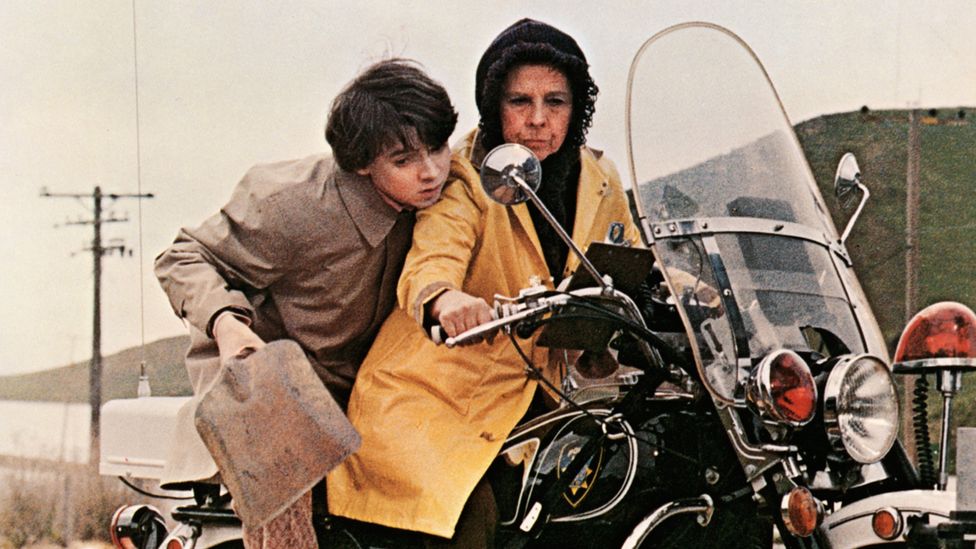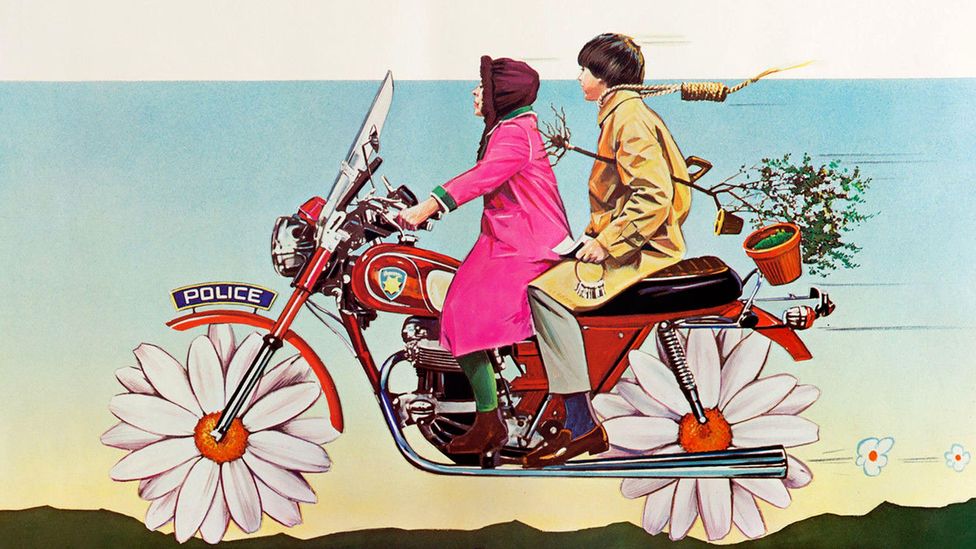I was introduced to 1971's cult classic Harold and Maude in my first year of university, when contemplating the point of life. After watching several staged deaths, as well as the developing relationship between a churlish 19-year-old man and a free-spirited woman 60 years his senior, I finished the film with an answer to my question.
More like this:
- The sci-fi that predicted modern crises
- The most outrageous film ever made?
- The classic that's saved lives
Harold and Maude was originally conceived as a 20-minute film, scripted by Colin Higgins, then a UCLA film student during the height of the Flower Power movement of the 1960s. The short, which centres on a death-obsessed teenager who falls in love with a life-adoring octogenarian – and consequently, with life itself – was written only a few years after Mike Nichols' The Graduate had sparked interest in romantic relationships between young men and older women, at a time when the counterculture was questioning boundaries. Although the age gap between Higgins' titular characters was much wider than Nichols' graduate and his older mistress, Paramount pictures agreed to take on the taboo-breaking project when the script was sent their way. It soon landed in the hands of Hal Ashby, one of the more revered directors of the New Hollywood era, who'd just received an Academy Award for his editing on In the Heat of the Night a few years earlier.

Harold and Maude bombed when it was first released, but had a revival later (Credit: Alamy)
As a studio-made yet thoroughly countercultural film, Harold and Maude proved a challenge for Paramount, and after a dismal promotional trail, the film opened to meagre box office sales. That same week, Disney's Lady and the Tramp stormed to the top of the charts, as audiences came to favour the love story between two cartoon dogs over one between a suicidal teenager and an eccentric elderly woman. Part of this can simply be attributed to poor timing. The anti-authoritarian, flower-power spirit that Harold and Maude espoused had generally fallen out of favour by the time of its release. The deaths of Jimi Hendrix and Janis Joplin the year before had signalled the end of an era. The Summer of Love slumped into dusk, and the hippie energy it carried curdled into cynicism. Audiences and critics mostly reacted to the film with revulsion. In one of the most famously scathing reviews Harold and Maude received, Variety wrote that the film was about "as funny as a burning orphanage".
It wasn't long before Harold and Maude would enjoy its cult revival, however, thanks to college campuses across the US, which screened late-night viewings of the film. Perhaps it was the film's Nietzschean spirit and its call to live deliberately, thoroughly, exuberantly that appealed to the stoned and listless liberal arts students of the '70s, or perhaps it was its satire of the American bourgeoisie and all its institutions – religion, psychology, the family, the military. Much like a precocious college student, Harold (Bud Cort) maintains his own sense of self through constant acts of resistance against these authority figures, and appears unable to communicate in the language of groupthink. He mocks his therapist's psychobabble with silence; his uncle in the army with overenthusiasm; his wealthy mother's conservatism with fake and theatrical acts of self-directed violence.
But Harold gladly gives into the authority of Maude (Ruth Gordon) – a woman who steals hearses, and rescues 'public trees' from smog. After meeting at a funeral (which Harold attends in order to be closer to death, and Maude to be closer to life), the Epicurean older woman soon becomes Harold's lover and mentor. While Harold seems to view life as merely an inconvenient and trivial path towards death, Maude is able to plumb as much meaning from life as death – and she shows Harold how.

Through her love of life, Maude is able to overcome Harold's fascination with death (Credit: Alamy)
During a walk through a field of daisies, Maude turns to Harold and says: "I should like to change into a sunflower most of all. They're so tall and simple. What flower would you like to be?" Harold replies that he would like to be one of the daisies "because they're all alike." Maude turns to Harold and explains the problem with his answer: "Oh, but they're not. Look, see. Some are smaller, some are fatter. Some grow to the left, some to the right. Some even have lost some petals. All kinds of observable differences." Harold looks on at the flowers in silence; his thoughts, which he once deemed immutable, now entirely demolished and reorganised by the principle of life itself. The camera pans out into an extreme long-shot, as it's revealed that the field of daisies Harold and Maude are standing in is a graveyard – the gravestones identical as daisies from the perspective.
Where other directors may have used a close-up shot to convey feeling, Ashby does the opposite, as he attempts to orient his viewer into an ecological point of view. Flowers growing out of gravestones. Cat Stevens' If You Want to Sing Out, Sing Out, the film's musical leitmotif, playing.
Stevens' soundtrack both seems to further embolden Maude's perspective and the lessons she hands down to Harold, while ameliorating the taboo relationship between old and young. Just as the strings swell when Rick and Isla kiss in Casablanca, so Stevens gives the same majestic treatment to Harold and Maude – but swapping violin strings for acoustic nylon guitar strings. This works most effectively during one of the film's most controversial scenes, when Cat Stevens sings over the sight of a naked Harold and Maude lying under bed sheets. Instead of smoking after sex, Harold blows a bubble as the music plays; blowing out life into the air, instead of taking ash into his lungs. He seems to have found the answer to the question "What is the point of living?" The point of living, I surmised by the film's end, is partly to accept death. To see it as an essential and beautiful and inevitable machine that regenerates more life. It never ceases. If anything, it encourages us to go and love some more.
Love film and TV? Join BBC Culture Film and TV Club on Facebook, a community for cinephiles all over the world.
If you would like to comment on this story or anything else you have seen on BBC Culture, head over to our Facebook page or message us on Twitter.
And if you liked this story, sign up for the weekly bbc.com features newsletter, called The Essential List. A handpicked selection of stories from BBC Future, Culture, Worklife and Travel, delivered to your inbox every Friday.
https://ift.tt/3bU4g0f
Film
Bagikan Berita Ini














0 Response to "Harold and Maude: The film that broke several taboos - BBC News"
Post a Comment